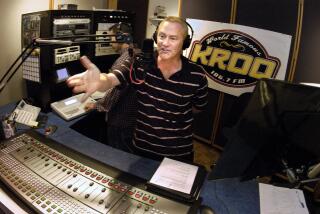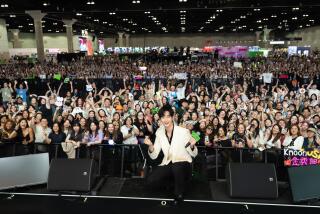KROQ Finally Sits on Top of a Two-County ‘World’
Despite its somewhat tongue-in-cheek slogan about being “world famous,” KROQ-FM (106.7) has not been able to lay claim to being the top-rated radio station in the Los Angeles-Orange County market during its 25-year history.
Not, that is, until now.
The alternative rock station finally finished first in the recently released Arbitron ratings covering March 29 to June 30. KROQ’s triumph also represents the first time in six years that an English-language radio station has been top-rated in this region. Partly reflecting the Southland’s changing ethnic demographics, Spanish-language station KSCA-FM (101.9) had ranked No. 1 during most of this period.
KROQ rose from averaging 4.5% of the audience in the previous three-month period to 5.1% this time around. It edged out KSCA and R&B; dance station KPWR-FM (105.9), both of which garnered a 4.8% share.
“A lot of our success has to do with the amount of popularity our music has right now,” explains Jed “the Fish” Gould, a KROQ deejay since 1978. “The number of KROQ artists that have Top 40 albums right now is relatively high. Plus, we continue to play adventurous bands that we have to ourselves, like Korn. So we’re playing a bunch of hot stuff that’s sweeping the country and cool stuff that nobody else is playing. That’s the ideal combination for a ‘new music’ station like us.”
The commercial success of what Gould terms “bad-boy rock and rap” has also helped KROQ corral a much more ethnically diverse listenership. Eclectic and aggressive-sounding bands such as Linkin Park--which merges rock, electronic and rap influences--are helping to bridge the gap between white and, particularly, English-speaking Latino listeners.
Trip Reeb, KROQ’s vice president and general manager, remembers a time 10 to 15 years ago when the Burbank station’s audience was overwhelmingly white. He says Arbitron’s latest figures indicate its audience is now about 36% to 40% Latino. He says attracting a sizable portion of this demographic is essential if a station is going to be top-ranked in the ultra-competitive Los Angeles radio market.
“Certainly, there’s a much larger Hispanic composition to the L.A. market as a whole now,” Reeb says. “[A lot of our growth] has come from younger Hispanic males that have an appetite for what we’re playing.”
KROQ has always prided itself on staying as current and as cutting edge as possible for a commercial rock station. While it may not be world-famous, it certainly has been recognized within the music industry for its role in launching successful careers for numerous acts, among them Depeche Mode and Blink-182.
Although KROQ is a beneficiary of alternative guitar rock’s current commercial resurgence, the station has also exhibited sound judgment in choosing which acts to highlight.
Tom Biery, senior vice president and head of promotion at Warner Bros. Records, says KROQ program director Kevin Weatherly fully embraced his label’s Linkin Park right after its “[Hybrid Theory]” debut album was released last October. Early radio exposure was tied to a KROQ-sponsored Linkin Park performance at a Best Buy consumer electronics store. At the time, the Los Angeles-bred band was little known, having spent much of its four-year existence developing songs rather than playing live shows. Linkin Park subsequently performed at the station’s Almost Acoustic Christmas show and was the centerpiece of its annual Weenie Roast concert last month. KROQ currently has two of the band’s songs (“Crawling” and “In the End”) in heavy rotation. “[Hybrid Theory]” is about to cross the 3-million sales threshold.
“Part of the reason KROQ continues to do well is because we made a decision years ago that we were going to be a radio station that was going to be about new music and about exposing new artists and targeting 20-to 30-year-olds,” Weatherly says. “Whereas some stations want their audience to grow with the radio station, we’ve accepted the fact that there’s going to be some [listener] attrition as we introduce new bands like Linkin Park or, five years ago, Rage Against the Machine. But we’re hoping that for every one we lose, we’re picking up two more listeners.”
A sense of continuity within its DJ ranks has also helped the station retain longtime listeners. Key on-air personalities such as Gould, Tami Heidi and the morning team of Kevin & Bean have been a part of KROQ for many years. This past quarter, “Kevin & Bean” was the top-rated English-language morning show for the first time in its 12-year tenure at KROQ.
“You can’t have big ratings numbers in this market unless you have a strong lead-in in the morning,” Weatherly says.
KROQ’s ratings jump was also aided by a special gig at the Roxy by Depeche Mode on June 4. Tickets were only made available to fans tuning into KROQ. Other promotions that helped elevate KROQ’s listenership were the station’s Weenie Roast concert and the KROQ Punk Rock Prom. The latter event found local high schools competing for an exclusive night at Magic Mountain, where the bands Offspring and Weezer performed. Two high schools were proclaimed winners after they completed 10 challenges, which included collecting 1,067 pounds of nonperishable food for charity and having their assistant principals stand in a vat of noodles and sing the Offspring song “Pretty Fly (For a White Guy).”
KROQ also has benefited from a lack of direct competition. There is no other commercial station in the Los Angeles area playing the same mix of new music. Its playlist includes a slew of hard-edged rock bands as well as acts as diverse as electronic artist Moby and pop-rock band Travis.
Noting that trends in pop music can change on a dime, Gould says KROQ isn’t taking its current success for granted.
“I thought the [current popularity of heavy rock and rock-rap] would have run dry by now, because trends have been burning out so fast in the past seven or eight years,” Gould observes. “[During that time] we had the swing mini-trend, the ska mini-trend and the chick rock mini-trend. Those went away pretty fast. Every single part of radio success is fragile. So we try to be as grateful as we can [when we are doing well].”
More to Read
Sign up for Essential California
The most important California stories and recommendations in your inbox every morning.
You may occasionally receive promotional content from the Los Angeles Times.










